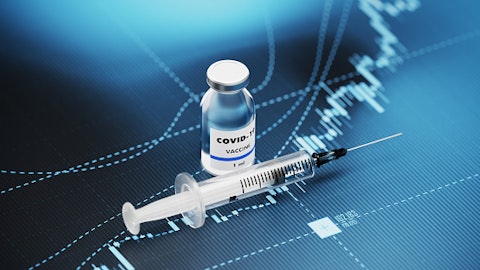And we are, as an industry, very vocal about it, right? It is for the patient. If you think about it, that companies will find different avenues move away, but what happens to the patient, if 90% of the prescription in the United States, how and who are going to fill those prescriptions. Then will you be dividing on a lower quality suppliers on reliable supply chain. So we believe the generics have picked the bottle in that sense for mature products. And we are seeing it a responsible behavior from certain biggest fine groups, and we appreciate that. For us, within generics, we got Plan D, because we have moved up to the value chain. And if you look at where we are going is that creating the next frontier of affordable medicine company, which includes €“ obviously, we will continue on the products we have and will enter the market as needed for the commodity generics products.
But we have moved up to the non-commodity products. What I mean by that, where the competitors are 10 to 15, not 100. Those are the products we have been working on, and we have introduced many of them. So that’s trial of the inhalation products, the injectable products, complex injectables coming up. So we’re very excited about the entire pipeline within generics and that is a part of being a next 20-year affordable medicine company globally (ph) biosimilars. And those are the companies if you see next two, three, four, five, seven years, will have plenty of products to use from, as you know, globally $400 billion of biologics lose exclusively over the next 10-years. So it’s plenty of products to work and it’s very difficult, very complicated manufacturing.
We do not expect even 30 competitors . It would be more of a 10 to 15 companies eventually stays in the United States and Western European markets, which are most regulated the requirements are stringent. So very excited building that affordable medicine company in the next 20-year and lead that. The second is the specialty. Specialty, that we added K-130, we have an excellent pipeline. People do underestimate IPX203, but we don’t we are ready. As you know, we have a lot of experience in launching Rytary, relaunching Rytary. We are very close to Parkinson patients and providers. They need this, I don’t think (ph) should exist. It’s a 30-years old technology. Why should you take IR when you have the product that’s giving you good on time, almost 1.55 hours per dose, that’s a meaningful improvement in Parkinson’s patient lives.
I think we are going to go for as big of a patient conversion as we can with affordable prices. So that is — we’re really excited on the specialty business. Healthcare is performing superbly well, double-digit. As you know, it’s a large distribution market, and we love to find our missions and compete in the distribution market. We have excellent team led by Steve and we’ll continue to grow that business, reusing great opportunities for us. And it also allows us to avoid the middleman and go direct to customer. And then the last thing I would mention is, we are not giving you full picture on our international expansion plans as we go in the next few quarters, we will. We’ve been working on it; you saw some highlights what we are doing. And why we are saying India, Middle East, these are the next 20-years of growth in the pharma for affordable medicines.





